Saleh Malas| Amal Rantisi | Ali Darwish
“At 1:45 a.m., my family and I woke up in panic to the sound of an unusual shelling. It was the onset of the siege on Eastern Ghouta. We had difficulty breathing. Recognizing the symptom, my older sister, who had a modest nursing experience, said that the missiles were likely loaded with chemical agents.”
Diaa al-Din al-Shami, 24, recounted to Enab Baladi the abject horror that overcame his family on 21 August 2013, who resided in Zamalka city, in Eastern Ghouta.
He added that their initial reaction was covering their noses with towels soaked in water, as not to inhale the Sarin agent that filled the air.
Diaa’s brother suggested that they move to the top floor of the five-story building. However, his mother could not reach the upper flight of stairs. She collapsed to the ground with his sister. Sarin already stole their breath from them.
“I saw my sister sitting on the stairs, screaming: ‘Oh God, I cannot see!’ Her voice turned hoarse, and she barely could scream anymore. My other sister was shaking, with foam coming out of her mouth. My older brother was backing himself against the wall, but he too collapsed. My younger brother, who always accompanied my mother, was hugging her as she lay motionless on the floor,” Diaa recounted.
Diaa was the only survivor of his family of seven.
“I felt a strange power and reached the building rooftop. There, I lost consciousness. I woke up two days later to the slap of a male nurse. He found me among the dead, and said: ‘You are alive!’”
Diaa suffered from a temporary memory loss. He could not remember anything over the week that followed the massacre, which he today describes as “the unforgettable day!”
Diaa lost 40 family members in the 2013 chemical attack on Eastern Ghouta and concluded his account to Enab Baladi, saying: “It is fate. That who is fated to remain alive, shall overcome the hardest catastrophes!”
Eight years after the Eastern Ghouta chemical attack, Enab Baladi discusses justice-seeking mechanisms that victims can adopt to hold accountable the perpetrators and the meaning and potential advantages trials might hold for the survivors.
“It was a horrifying scene”
That day, chaos consumed paramedics and nurses, said Qussai, a 28-year-old young man who back then worked for the al-Fateh Hospital in Kafr Batna town. “We started hearing the sounds of distant explosions. Then threads of cars started to hurriedly reach the hospital where I worked. They asked us to be prepared, wear gloves and masks, because these were victims of a chemical attack.”
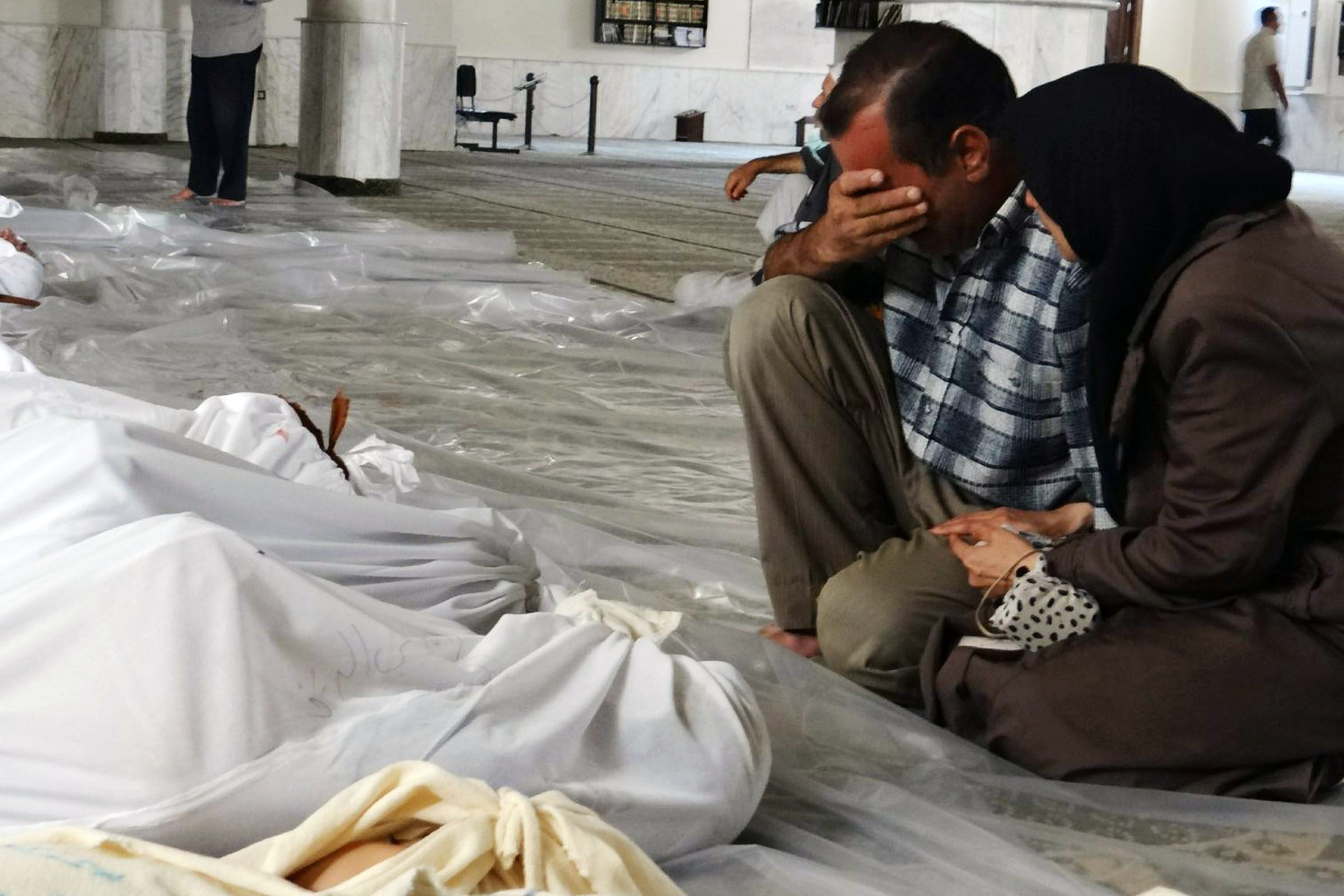
A Syrian couple crying next to the dead bodies of the people killed in the chemical attack on Eastern Ghouta, in Damascus’s countryside — 21 August 2013 (AFP)
The hospital staff did not have the needed knowledge to handle cases of people affected by chemical attacks in general, and the Sarin agent in particular. “They had little to no information about chemical weapons and agents,” Qussai told Enab Baladi, wishing to withhold his last name for security concerns.
“The hospital security started to screen the victims. Those with stable conditions were sent to the emergency ward. Those with serious conditions were sent to the operations room. A half an hour later, the driver of the ambulance told me that there were many casualties in Zamalka and the people were collapsing without any one to help them,” Qussai added.
“My friend and I headed to Zamalka and evacuated some of the affected people. We found them laying on the floor inside their homes, gasping for breath. We could not hospitalize everybody. In one of these houses, we discovered a father, a mother, and their little girl dead. They all suffocated. It was a horrifying sight. We carried their bodies and put them in the ambulance. We returned to the hospital and dispatched another ambulance,” he added.
Qussai and his friend Hamza, a nurse, were affected by the Sarin agent as they hospitalized the victims. Qussai was admitted into the ICU, but Hamza died.
Enab Baladi interviewed Rama al-Haj al-Ali, who gave an extensive account on the night’s chemical attack. Rama said that one scene, in particular, was etched on her mind on 21 August. She and her family assembled in one of their house’s corridors on their way out. They were escaping the extensive shelling. There, “my sister, back then 4 years old, was holding her doll. She said I want two pieces of cloth, one for me and one for the doll. I do not want my doll to die,” Rama narrated.
At the time, Rama was 15-year-old and a 9th-grade student. “I was still awake, studying. I was hearing the sounds of successive missile bursts. Then, a sharp odour started spreading. I did not know what was happening.”
At dawn’s call for prayer, the mosque’s Imam started shouting, “Allahu Akbar! The regime has carried out a chemical attack!” It was then when Rama learned what was happening.
“My body just froze. I did not know what to do. I could not fathom what a chemical attack was!” Rama described her feelings the second she heard the Imam.
Rama lost her aunt and her aunt’s family in the chemical attack. She also lost her grandfather in the extensive shelling that day.
To the court
Military commanders brought to justice
To criminalize the persons involved in the 21 August chemical attacks, the public prosecution must provide the court with strong evidence that the head of the Syrian regime, Bashar al-Assad, and his affiliated military commanders were deliberately seeking to exterminate civilians in Eastern Ghouta.
Because the attack is a collective crime, the evidence must be collected from the crime’s various scenes.
Both the nature of the evidence and the manner of evidence collection pose challenges to the rights organizations pursuing justice for the victims.
Last March, a group of chemical attacks survivors and the Syrian Centre for Media and Freedom of Expression (SCM)— backed by the Justice Initiative and the Syrian Archive— filed a complaint, requesting that the French judiciary start a probe into the chemical attacks in Syria and to combat impunity, the SCM reported in a statement.
To meet the requirements for the complaint on procedural grounds, the SCM based its claim for justice on the principle of extraterritorial jurisdiction. Thus, the SCM managed to overcome a major barrier.
Judges in France were provided with an evidence list of 491 items, including a significant and exclusive set of footage and videos which document the chemical attacks, the SCM’s litigation officer, al-Mu’tasem Kailany, told Enab Baladi, adding that the list also included maps that locate the exact sites of the attacks and the spots where the missiles landed.
The data the maps demonstrated were being collected and verified by the Violations Documentation Center in Syria (VDC) since August 2013. The VDC was headquartered in Duma city, in Eastern Ghouta, back then.
There are some differences between the principles of extraterritorial jurisdiction and universal jurisdiction, which are adopted by most plaintiffs who seek legal action at European courts against perpetrators of crimes against humanity and war crimes in Syria.
Extraterritorial jurisdiction refers to a state’s legal ability to exercise authority beyond its normal borders. For instance, should one of the state’s nationals commit a serious crime outside the state’s territory, the state will still maintain the right to prosecute him/her.
Kailany said that this principle legally empowers States to hold accountable individuals who committed crimes against their citizens. This principle applies to the complaint filed in France because the SCM is registered in France since 2003 and had an office in Damascus’ Eastern Ghouta at the time of the attack. Accordingly, the SCM qualifies to be a French victim.
Kailany added that the SCM’s Strategic Litigation Project Team spent four years tracking and analyzing evidence.
The list of evidence the team presented to the French investigating judge is of paramount importance because it includes documents on the military command chain, identifying accurately the officers involved in making the orders and carrying out the attacks, from top to bottom, starting with the president of the republic— Commander in Chief of the Army and Armed Forces—, to the lowest ranking militant in the hierarchy of command, Kailany said.
He added that the documents include the names and ranks of 246 officers from the 4th Division, headed by Major General Maher al-Assad, brother of Bashar al-Assad, and 94 officers from the 155th Missile Brigade, in addition to 32 officers from the 106th Republican Guard Brigade.
The SCM’s team also confirmed that the Syria Scientific Studies and Research Centre (SSRC) is linked to the attack, backing the documents with a chart of the administrative structure of the chain of command in the center, as the names, ranks and positions of 418 of its employees were identified, including officers, individuals, administrators and technicians.
The team also corroborated the role assigned to the Institute 540, responsible for warehousing toxic gases, especially sarin, which was used in the attacks, and training military personnel to equip warheads with it.
In a research paper, the Syrian Archive provided information on the SSRC that oversees the production of Syrian chemical weapons, also revealing the SSRC’s administrative structure.
Moreover, the list of evidence also includes numerous first-hand testimonials provided by 61 witnesses and survivors, among them defectors from the military formations listed above. The defectors played a major role in defining the perpetrators’ individual criminal responsibility.
All these data are currently in possession of the relevant investigative judges assigned by the French Public Prosecution Office to oversee the case submitted to them, Kailany said, expecting the judges to issue a foreign subpoena against the chief suspects.
The French Criminal Code allows the judiciary to issue sentences in absentia against suspects involved in these violations.
Based on the principle of universal jurisdiction, similar complaints against the use of chemical weapons in Eastern Ghouta were submitted in Germany and Sweden in 2013 and in Khan Sheikhoun in 2017. Kialany said that the prosecutor’s office is currently awaiting a decision to accept the complaint, adding that evidence will be delivered to judges in the upcoming months to corroborate the files that were previously submitted to them to accept the complaint and start the investigation process by the competent judges and war crimes units.
The most valuable evidence in the investigations is the initial or direct evidence. When proven solid, the evidence would confirm the chemical massacre. The statements of witnesses and victims that are recorded in the interviews are a form of direct evidence.
Indirect evidence, which tends to confirm the occurrence of the incident, is also important. Indirect evidence may corroborate and intersect with statements recorded during interviews with witnesses, such as medical records that can lead to a conclusion confirming the massacre.
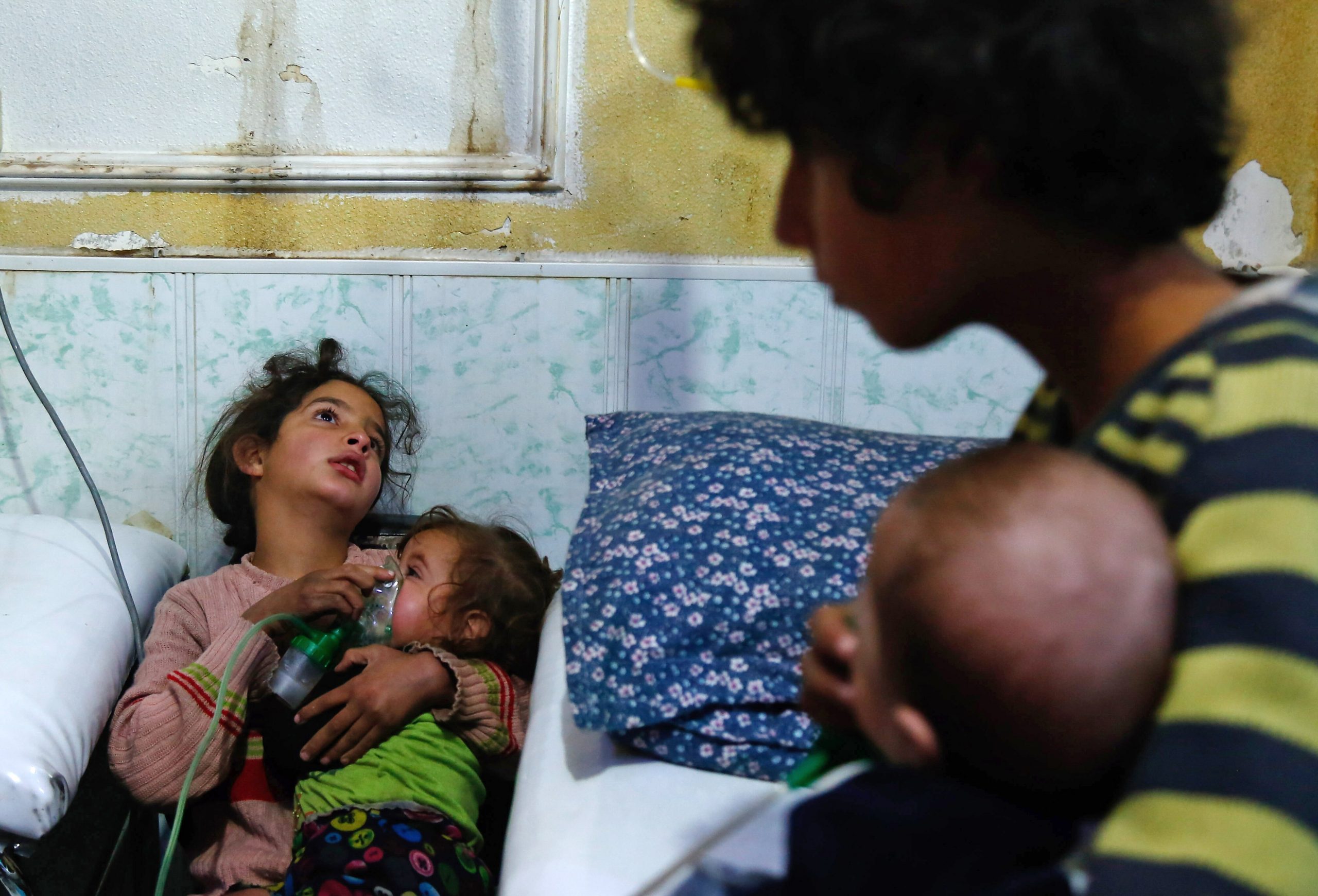
A Syrian little girl holds an oxygen mask over an infant’s nose in a makeshift hospital after a chlorine gas attack on the town of Duma in Eastern Ghouta– 22 January 2018 (AFP)
Protecting memory
Role of advocacy in bringing perpetrators to justice
On 21 August 2020— the anniversary of the large-scale Ghouta chemical attack— a group of Syrian activists launched the “Do Not Suffocate the Truth” campaign. Since then, the campaign’s demands have continued, aiming to counter the denial of the chemical massacres in Syria.
A member of the campaign team, Fadi al-Amin, told Enab Baladi that the campaign stands in the face of lies and confronts the attempts at denial by the Syrian regime and its Russian ally, which they use as a tool to erase the memory of chemical massacres and obliterate the truth.
The campaign also works to raise awareness among Syrians about the use of chemical weapons in Syria and to keep the memory of chemical massacres in Syria always present to the Syrians and the world, which contributes to everyone taking their role towards justice, including human rights defenders, politicians, witnesses, victims’ families, and others.
Al-Amin believes that the justice process may be long and frustrating, as it requires a long-term cumulative construction.
The campaign is not a civil society organization but rather includes a team, many of whose members work on a volunteer basis.
“On the individual level, some of us participate in other advocacy campaigns and activities. For this campaign, we coordinate with the (Syrian Civil Defense), (Syrian Center for Media and Freedom of Expression), and (Syrian Campin),” he said.
He added that the campaign helps people who lost family members during the massacre by preserving the true story of what happened, i.e. the story of the victims and their families, and preventing its obliteration, which keeps the survivors away from the feeling of isolation that frustrates them and prevents them from holding on to the path of justice.
He added that “holding the perpetrators to account and preventing the repetition of these massacres is the only consolation that might help the families of the victims.”
The campaign also holds online special awareness sessions, targeting Syrian activists, presented by experts on the use of chemical weapons in Syria. It also invites Syrians to hold on-ground activities that contribute to keeping the memory of chemical massacres alive, as well as enriching the scientific and technical content related to the issue.
The SCM’s Director of Advocacy and Communication Department and former Syrian diplomat, Danny al-Baaj, explained to Enab Baladi the role of the concerned organizations’ advocacy for chemical victims is no different from the advocacy efforts for the rest of the cases of violations in Syria.
Al-Baaj said that, without exception, all these organizations try to mobilize their relations, the actor countries in Syria and international non-governmental organizations to secure a path of accountability.
He added that the main and permanent goal is to refer the file of violations in Syria to the International Criminal Court (ICC) so that efforts are not dispersed across local courts worldwide.
However, he said the efforts to refer the file to the ICC collides with an international political decision of two key countries, Russia and the US.
In 2014, Russia and China used their “veto” to object to a Security Council resolution that would have granted the plaintiff this mandate. The veto prevented any steps from being taken on the path to ensuring real accountability against the regime’s government, inside or outside Syria, which led to more violations.
Al-Baaj said that the US does not encourage resorting to the ICC, as they do not want to follow this path in managing the Syrian file.
The optimal solution for accountability is to achieve transitional justice at a national level in Syria, but this solution is currently unavailable. Accordingly, there should be different tools.
Current advocacy efforts aim to have a path to accountability through domestic courts in all countries in which complaints can be submitted.
No other options
Documentation of chemical violations continues
Syrian human rights organizations focused on documenting what happened on 21 August, reaching out to eyewitnesses, affected persons, and the victims’ data.
The Syrian doctor Muhammad Katoub, a humanitarian activist and former aid worker, told Enab Baladi that documenting violations is ongoing.
He added that the victims of chemical attacks do not have other paths and options. Therefore the work carried out by the relevant Syrian and international organizations in filing complaints to the European judiciary using universal jurisdiction is the only accountability path currently available, given that several bodies have investigated and are still investigating the use of chemical weapons.
These human rights groups produced dozens of reports that pointed the finger at the Syrian regime directly.
Therefore, if the Public Prosecutor refers the file to a court and this court manages to convict the Syrian regime, it will be the first time that the file of the use of chemical weapons has moved from the scope of investigations and finger-pointing to the scope of conviction.
There are also efforts to press the judicial systems in Germany, France, and Sweden, where complaints were submitted, to cooperate. These efforts are made by voices calling for creating a joint international mechanism for accountability, given that all roads to the ICC and the International Court of Justice (ICJ) are challenging to pursue, according to Kutoub.
Of course, this remains “below the required justice,” according to Kutoub, especially since these judicial systems may not extend to criminals who do not reside on their lands. Perhaps the issue is limited to issuing a few arrest warrants against several officers and government figures involved in the use of chemical weapons.
Nevertheless, filing complaints remains an important step, and Kutoub believes that all efforts through the Security Council have not led to more than investigations, and all efforts outside the Security Council have only led to sanctions and the freezing of the regime’s membership in the Organization for the Prohibition of Chemical Weapons (OPCW).
International conviction, would it prevent the political reproduction of al-Assad?
Perhaps the regime’s targeting of opposition-controlled areas with chemical weapons was one of the most prominent violations that led Western countries and the Security Council to put pressure on the regime, especially after representatives of the OPCW began their work on Syrian territory, discovering several areas where chemical attacks had been committed.
The organization’s investigations, in April 2020, proved the regime’s responsibility for sarin and chlorine attacks on al-Lataminah in Hama countryside in 2017, which was then under the control of the opposition.
The regime then failed to comply with a 90-day deadline by the organization’s governing body to declare the weapons used in the attacks and disclose its remaining stockpile.
Another investigation by the organization also proved that the regime carried out a chlorine bomb attack on the city of Saraqib, which was controlled by the opposition in 2018, but the regime’s government did not fully comply with the 2013 agreement, which was mediated by the US and Russia to get rid of chemical weapons.
However, no actual measures were taken to hold the regime accountable for the proven attacks, which raises a question about the feasibility of the work of the OPCW and the role it can play in cooperation with Western countries.
The Syrian-Canadian academic Faisal Abbas Muhammad, who holds a Ph.D. in Middle Eastern studies from Canada, told Enab Baladi that “it is clear that the light shed on the issue of the crimes of the chemical attacks launched by the regime no longer befits the issue’s importance and gravity, but the efforts of specialized experts in UN organizations are still going on.”
He added that placing al-Assad and his brother Maher behind bars, even if in absentia, “would be an additional reason for European countries to refrain from providing financial aid for the reconstruction of Syria, and would impede the regime’s desperate efforts to normalize itself.”
He referred to the efforts made by some Syrian refugee victims of chemical attacks to file lawsuits in both France and Germany, saying that the judicial system (represented by the Public Prosecutor) in both countries showed a serious interest in pursuing these lawsuits, and two special courts were established for this purpose, one French and the other German.
These steps may not result in additional international efforts in the context of a global consensus to isolate the regime, according to Dr. Muhammad. “As soon as matters reach the Security Council, the Russian and Chinese vetoes would undermine such efforts.”
He added that, however, “in the end, these efforts will make normalization with the regime a matter that is difficult to justify morally, legally and diplomatically, and the countries concerned will not hesitate to act unilaterally to isolate and impose sanctions on the Syrian regime.”
In an April 2021 statement, Marjolijn van Deelen, the EU Special Envoy for Non-proliferation and Disarmament, said that “accountability is essential to prevent the re-emergence of chemical weapons. The use of chemical weapons by anyone – be it a State or a non‐State actor – anywhere, at any time and under any circumstances is a violation of international law and can amount to the most serious crimes of international concern ‐ war crimes and crimes against humanity.”
“The Convention is clear: in these circumstances, Article XII of the Convention provides that the Conference may suspend the rights and privileges of the State Party concerned, as recommended by the EC in its decision EC-94/DEC.2 dated 9 July 2020,” she added.
“Syria’s refusal to redress the situation cannot and must not remain unanswered. The European Union and its Member States therefore consider that the draft Decision suspending Syria’s rights and privileges (C-25/DEC/CRP.10, dated 25 November 2020) is an appropriate response by the Conference to the clear violation of the core principles of the Convention. The draft Decision is co-sponsored by 46 States Parties,” she reiterated.
In the statement, the EU expressed that it is “determined to ensure full follow up of its findings,” adding that it “has already imposed restrictive measures on five high-level Syrian officials and scientists and one entity for their role in the development and use of chemical weapons.”
“We are ready to consider introducing further measures as appropriate, and continue to work on national as well as international levels towards ensuring accountability for those responsible for these egregious crimes,” the EU stressed.
if you think the article contain wrong information or you have additional details Send Correction
النسخة العربية من المقال
-
Follow us :












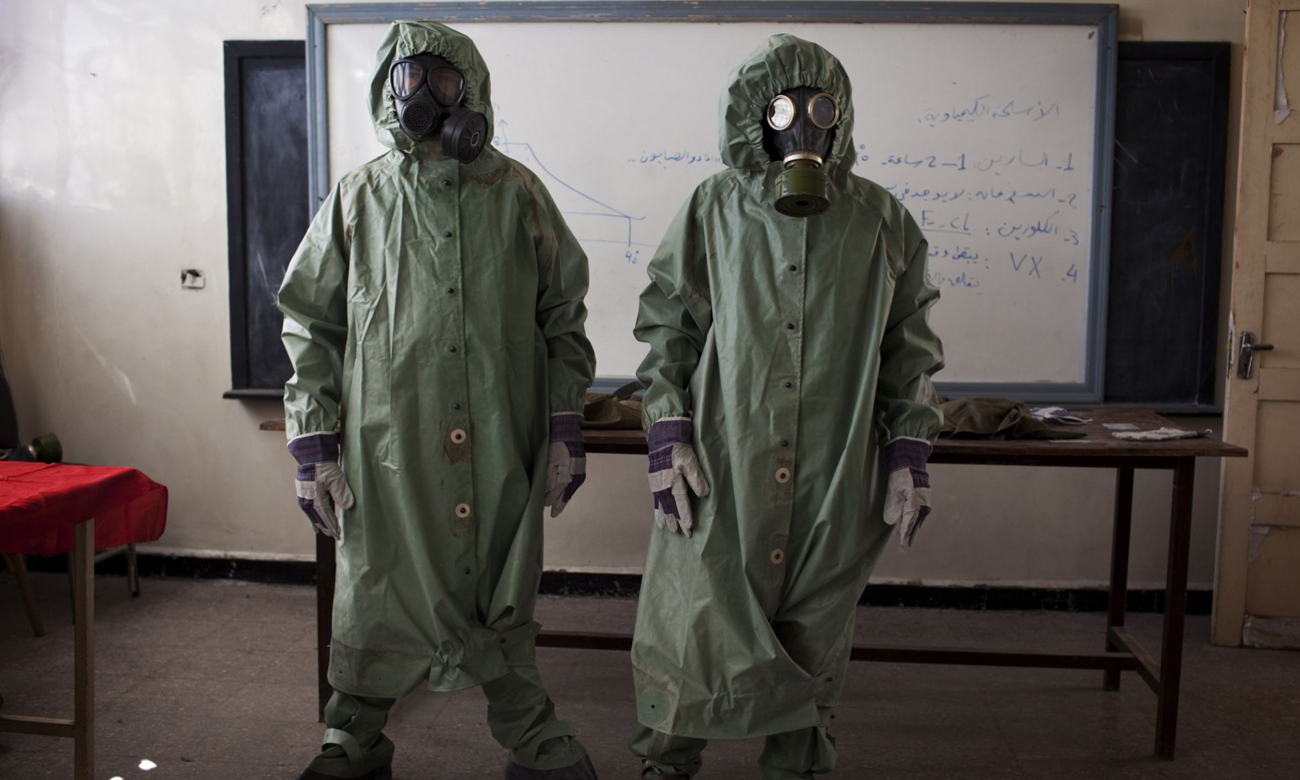






 A
A
A
A
A
A
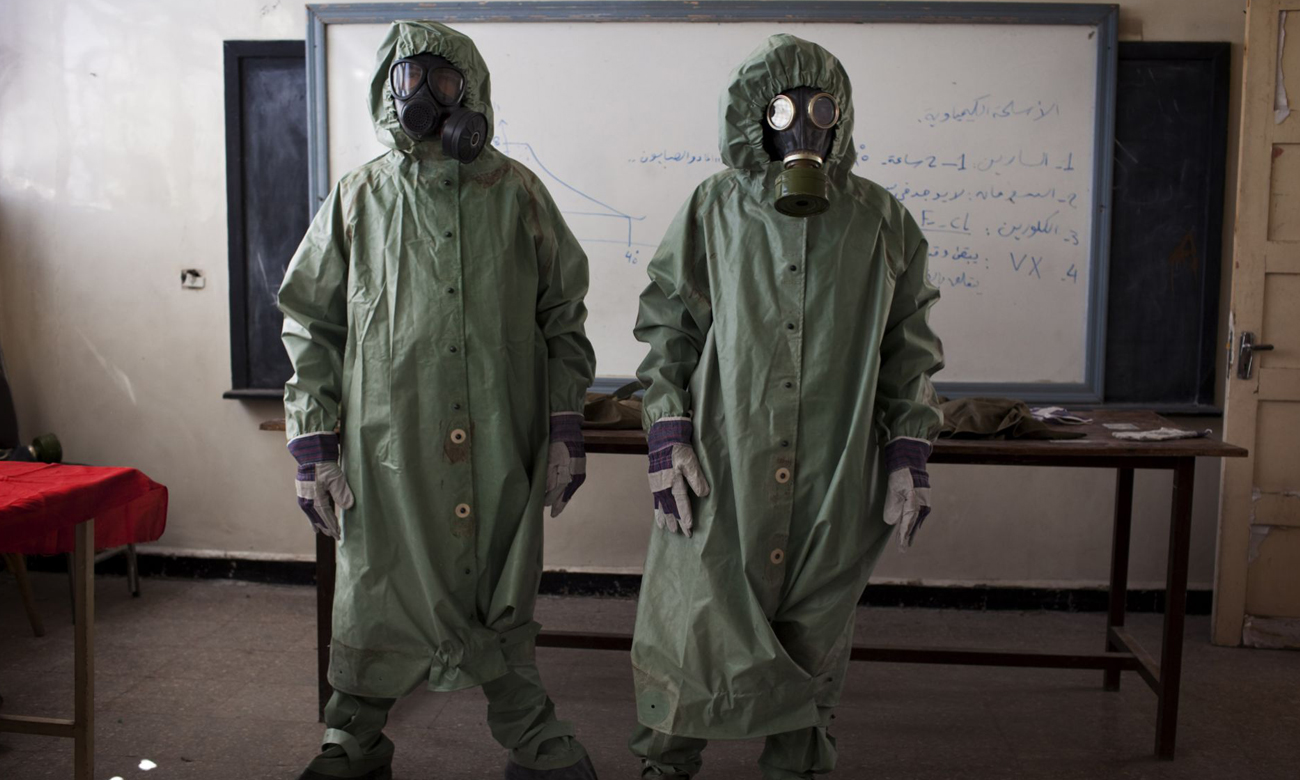

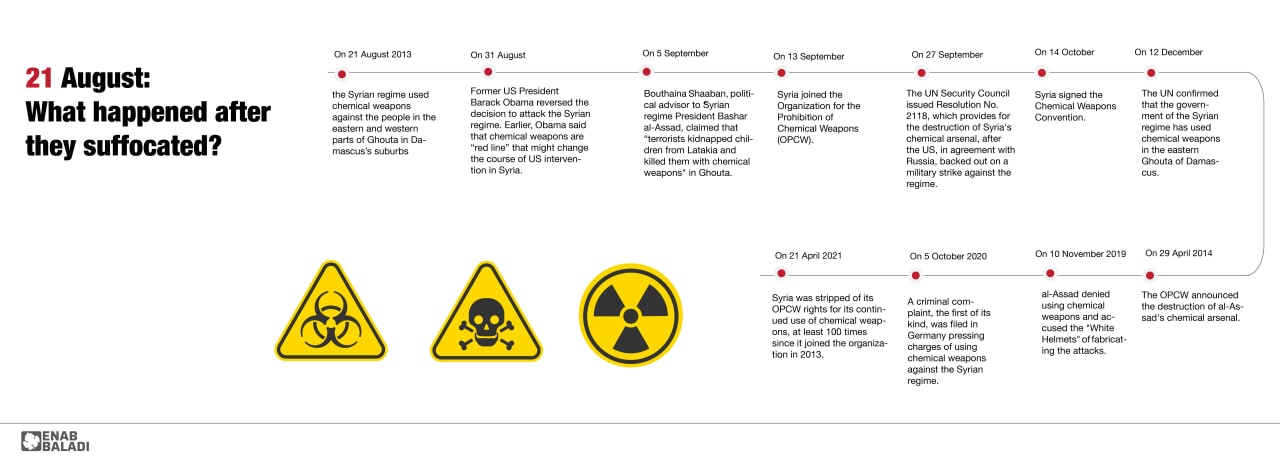
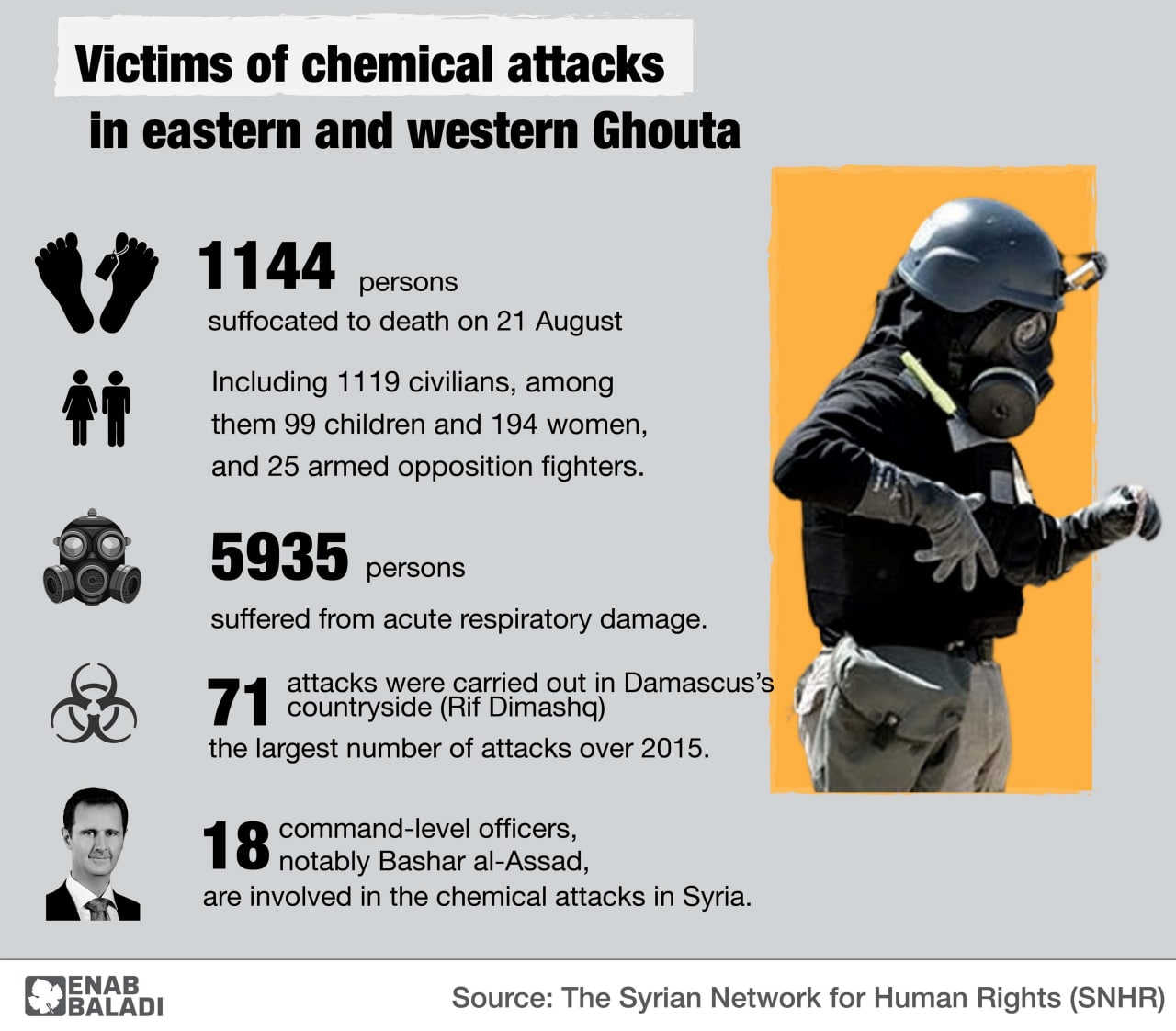
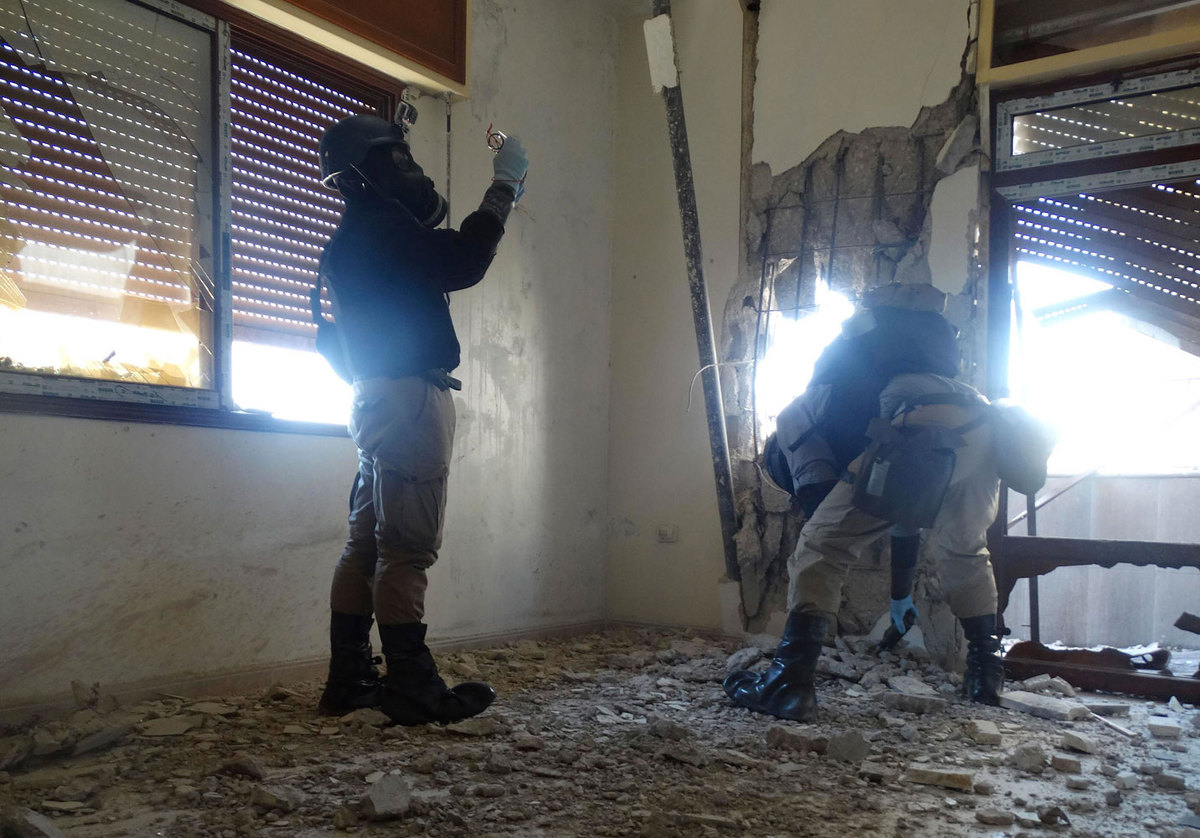



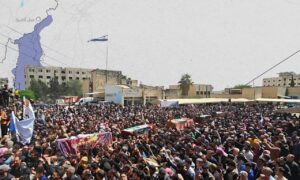



 More In-Depth
More In-Depth